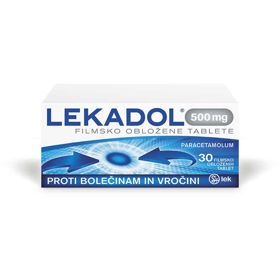Vprašanje stranke:
Kako se kaže vnetje ščitnice? Vprašanje anonimne stranke
Odgovor farmacevta:
Tiroiditis ali vnetje ščitnice vključuje skupino posameznih motenj, ki povzročajo vnetje ščitnice, vendar se kažejo na različne načine. Obstaja več različnih vrst tiroiditisa.
Hashimotov tiroiditis
Hashimotov tiroiditis povzroči napad imunskega sistema na ščitnico, ki jo poškoduje in povzroči otekanje.
Ker ščitnica sčasoma propade, ne more proizvesti dovolj ščitničnega hormona. To vodi do simptomov, kot so utrujenost, povečanje telesne mase in suha koža. Otekla ščitnica lahko povzroči tudi golšo.
De Quervainov (subakutni) tiroiditis
De Quervainov (subakutni) tiroiditis je boleča oteklina ščitnice, ki naj bi jo sprožila virusna okužba, kot sta mumps ali gripa. Najpogosteje se pojavi pri ženskah, starih od 20 do 50 let. Običajno povzroča visoko temperaturo in bolečine v vratu, čeljusti ali ušesu. Ščitnica lahko sprosti tudi preveč ščitničnega hormona v kri (tirotoksikoza), kar povzroči simptome čezmernega delovanja ščitnice (hipertiroidizem).
Poporodni tiroiditis
Poporodni tiroiditis je občasno stanje, ki lahko prizadane še posebej ženske, ki so pred kratkim rodile. Najpogostejši je pri ženskah s sladkorno boleznijo tipa 1 in anamnezo poporodnega tiroiditisa. Poporodni tiroiditis povzroči začasno zvišanje ravni ščitničnih hormonov in simptome prekomernega delovanja ščitnice. Nato po nekaj tednih žlezi zmanjka ščitničnega hormona, kar vodi do znižanih ravni ščitničnih hormonov in simptomov nezadostnega delovanja ščitnice.
Tihi tiroiditis
Tihi tiroiditis je zelo podoben poporodnemu tiroiditisu, vendar lahko prizadene moške in ženske in ni povezan s porodom. Tako kot pri poporodnem tiroiditisu lahko obstaja faza visoke ravni ščitničnih hormonov, ki povzroča simptome prekomernega delovanja ščitnice. Temu lahko sledijo simptomi nizko intenzivnega delovanja ščitnice, preden simptomi izginejo v 12 do 18 mesecih.
Z zdravili povzročen tiroiditis
Nekatera zdravila lahko poškodujejo ščitnico in povzročijo simptome prekomernega delovanja ščitnice ali simptome nizke intenzitete delovanja ščitnice. Simptomi so običajno kratkotrajni in se lahko izboljšajo, ko prenehate jemati zdravilo.
Tiroiditis, ki ga povzroča sevanje
Ščitnico lahko včasih poškoduje radioterapija ali zdravljenje z radioaktivnim jodom, ki se uporablja za čezmerno delovanje ščitnice. To lahko vodi do simptomov prekomernega delovanja ščitnice ali simptomov premajhnega delovanja ščitnice.
Akutni ali infekcijski tiroiditis
Akutni ali infekcijski tiroiditis je običajno posledica bakterijske okužbe. Je redko stanje in je povezano z oslabljenim imunskim sistemom ali pri otrocih, s težavo pri razvoju ščitnice. Simptomi lahko vključujejo bolečino v grlu, splošno slabo počutje, otekanje ščitnice in včasih simptome prekomernega ali premajhnega delovanja ščitnice.
Zanimivo branje: Vnetje živca na roki simptomi
Zanimivo branje: Vnetje oči domača zdravila








 Facebook
Facebook
 Instagram
Instagram
 info@moja-lekarna.com
info@moja-lekarna.com

